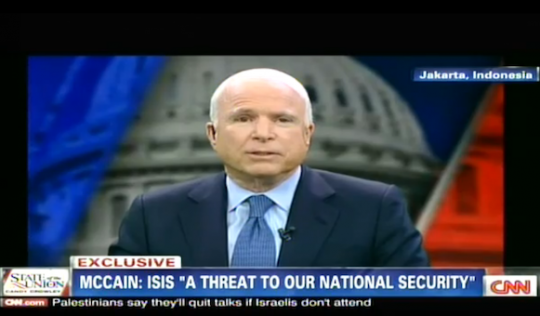Republican lawmakers criticized the president for authorizing only limited action in Iraq while Democratic lawmakers maintained support for President Obama’s current strategy in comments made on Sunday.
President Barack Obama yesterday declined to give a timetable for the strikes, but reiterated that there will be no boots on the ground.
Republicans slammed the president’s proposal, saying it did not go far enough.
"This is an Iraqi problem, but it's a United States problem, and it is a threat to our national security," said Sen. John McCain (R., Ariz.).
"I say that with the full backing, or the quotes, from our Director of National Intelligence, our Secretary of Homeland Security, the Director of the FBI, and even the Attorney General of the United States. This is turning into, as we had predicted for a long time, a regional conflict which does pose a threat to the security of the United States of America, and launching three strikes around a place where a horrible humanitarian crisis is taking place, meanwhile ISIS continues to make gains everywhere… it’s clearly very, very ineffective to say the least," McCain said on CNN’s "State of the Union."
The Senator contended that dealing with a humanitarian issue is not a comprehensive strategy to deal with the escalating problem.
"The president made it clear that this was to avert the humanitarian crisis, that they were taking these actions, and to protect American military personnel that are in Irbil and Baghdad. That's not a strategy. That's not a policy. That is simply a very narrow and focused approach to a problem, which is metathesizing as we speak."
Rep. Peter King (R., N.Y.) said on NBC’s "Meet the Press" that the United States has a multitude of options, but laying out the limits of U.S. intended strategy is a grave mistake.
"We can't wait for Maliki or the Iraqi parliament to fight ISIS. Every day that goes by ISIS builds up this caliphate and it becomes a direct threat to the United States of America. They are more powerful now than al Qaeda was on 9/11," said King.
"I lost hundreds of constituents on 9/11. I never want to do that again. We see this coming, and so for the president to say ‘we're doing airstrikes, we’re not doing anything else, we're not going to use American combat troops, we’re not going to do this, we’re not going to do that.’ What kind of leadership is that? You should never let the enemy know what you're going it to do."
King pointed out that escalation, or a stronger response, does not necessarily mean sending combat troops into Iraq.
"Let’s not set up the false argument that it has to be troops on the ground. We have the entire weight of the American military, plus we can work with the Kurds," said King. "We can provide weaponry to the Kurds, who have been good fighters. No one has been more loyal to us then the Kurds."
Political commentators acknowledged the difficultly of making these decisions, but also pointed to the administration as failing to recognize the threats abroad.
Laura Ingraham told "Fox News Sunday," "We’re almost in an impossible situation. The American people really have no appetite for America to reengage … [Obama’s] reacting to that, but he’s also, as the Washington Post pointed out yesterday, he’s now, I think reluctantly, seeing the perils of inaction."
Appearing on the same panel, Ron Fournier of the National Journal expressed skepticism that Obama understands the dangers facing the U.S.
"[ISIS’s] mission is to take us out. We're going to get hit. They are coming after us and we are going to get hit if we don't figure out how to stop them. So short term, yes, the president is doing fine. Long term, this is a president who underestimated ISIS; he called them ‘JV.’ He underestimated what was going to happen after Libya… He underestimated Putin. He underestimated several other areas. He's been the Commander in Chief or the Under-Estimator in Chief," said Fournier.
Democrats were more supportive of the president, urging the Iraqis to stand up on their own.
"Only Iraq can save Iraq. The president has stepped in because of this threatened genocide; I support that. Bringing food and water to these people who are dying on that mountain top, of course the United States should do that, and when it comes to the Kurds," said Sen. Dick Durbin (D., Ill.). "And we also want to make certain that Americans that are on the ground are protected. The bottom line is this, there's so much we can do to help the Iraqis help themselves, but ultimately, they have to save their own country."
Durbin cautioned against expecting a more serious intervention.
"Escalating it is not in the cards. Neither American people nor Congress are in the business of wanting to escalate this conflict beyond where it is today," he said.
